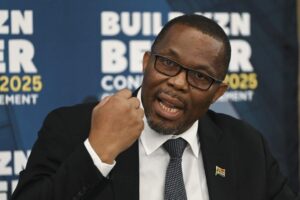In March, KZN’s Economic Development, Tourism and Environmental Affairs (EDTEA) portfolio committee conducted oversight inspections in uMkhanyakude. The first was to the Utshwayelo fish processing project, where we arrived at a thatch structure on the roadside just before the Kosi Bay border. With no signage or indication of the purpose of the facility, we were ushered to inspect four small containers – one refrigeration container without a secure electricity supply, two preparation facilities and an office space. A small thatch structure had been erected to serve as a restaurant. To the average passerby, this project would have gone unnoticed. The second project visited was a Marula factory. A stunning brand-new facility but there was a catch – nobody was there and nobody had used the facility for the entire week.
The reason for my recounting these oversight visits is that while EDTEA may institute well-meaning projects, if it is not well organised and outcomes-based then the department fails at the very core of its purpose. While there are problems facing EDTEA, there are just as many solutions. And as part of KZN’s Government of Provincial Unity (GPU), the DA knows that we are working to move beyond rhetoric to embrace these opportunities and solutions together.
First, we must confront the economic reality. According to StatsSA, KZN’s expanded unemployment rate was 44.7% in December 2024. While this sounds like a shocking statistic, to be bandied about, we must not forget that this is the daily struggle faced by millions of our residents. And the fact is that our economic woes are likely to be compounded against the backdrop of recent United States tariffs – which impose a 30% duty on South African automotive exports – threatening one of our province’s economic pillars. KZN’s automotive industry, vital for jobs and investment, now faces unprecedented risk. Without proactive trade diplomacy and immediate economic diversification, thousands more people could be left unemployed.
Another economic threat facing KZN is that of our sugar industry, once the pride of our province, which is facing huge challenges. Recent reports reveal more than 16 000 job losses, pushing this crucial sector to the brink of collapse. However, the solution is within reach and government can play a key role here. The crisis is due to a combination of factors, including the long-term decline in production, impact of climate change and economic pressures such as sugar tax and cheap imports. This has been worsened by recent civil unrest, the 2022 floods and the financial instability of big players including Tongaat Hulett and Gledhow Sugar Mill entering business rescue.
These challenges have led to job losses, revenue decline and uncertainty across the industry. While there are efforts to diversify into products such as sustainable fuels and bioplastics, success depends on urgent government support and investment. A multi-stakeholder approach is now more critical than ever: collaboration between stakeholders, communities and government are required to find effective resolutions to the declining industry. The DA-led Western Cape has shown that proactive economic management, focused on strategic sectors such as agriculture and technology, significantly boosts employment. It is time KZN adopted this proven model.
While there are major economic threats, there are also big opportunities. The Cannabis and Hemp industry has a staggering potential size of R28bn, with the capacity to create between 10 000 and 25 000 jobs across South Africa’s value chain – and KZN is in a prime position to take advantage of this.
EDTEA has invested in a Hemp-Cannabis shared processing facility in Okhahlamba Local Municipality. However, this is a drop in the ocean and government should be ramping up all efforts in this sector. Hemp fibre products produced in SA alone have huge export potential. In one example, local women produced 20 000 hemp fibre bags which were sold in New York. This is an example of how we can tackle unemployment and create a booming economy in KZN.
Speaking of opportunities, tourism was once KZN’s golden goose. Today, not only has that goose stopped laying eggs in our province – it has migrated to the Western Cape. One of the main problems is eThekwini’s chronic water pollution. Six major beaches once again recently registered dangerously high E.coli levels and Laguna, Doonside, and Winkelspruit beaches were closed before Easter. EDTEA currently has three criminal cases against eThekwini, including those against senior officials which are ongoing since January 2022 and which remain unresolved. This inertia emboldens negligence and environmental mismanagement. The National Prosecuting Agency (NPA) needs to finalise these criminal cases and hold responsible officials accountable. EDTEA must ensure that this comes to a conclusion, otherwise, what is the point of the National Environmental Management Act?
KZN is rich in all the ingredients that make for a world-class tourist destination. Miles of beautiful beaches, rolling valleys and hills, the majestic Drakensberg and rich cultural heritage, not to mention delicious bunny chows. We just need to get our tourism strategy right. We know that our natural heritage is unrivalled and that the link between the success of our tourism economy and our ability to maintain and protect our natural heritage is undeniable. Yet, our conservation efforts continue to face major challenges.
Rhino poaching remains a bloody stain on KZN’s conservation record with 325 rhinos slaughtered in 2023 and 228 in 2024. While dehorning and staff polygraph testing have helped – and EDTEA should be commended for these interventions which have brought down this figure – this battle cannot be won without rangers at the front line. The shocking reality is that there are 367 unfunded ranger vacancies within KZN Ezemvelo Wildlife (EKZNW). These frontline positions must be urgently filled in order to effectively protect our wildlife. KZN’s rhinos are not only valuable to us, but to the world.
EKZNW has the potential to regain its place as a world-class environmental management authority, but it must focus on conservation. Its tourism sites – once jewels attracting tourists from around the globe – now languish due to underinvestment and poor management. Ezemvelo must, as a matter of urgency, adopt private-public partnerships (PPP) to restore these facilities to a high standard, boost tourism revenue and directly fund conservation efforts such as hiring rangers, fencing reserves and hiring security personnel to protect our natural assets.
On the topic of wildlife management, the DA would like to bring attention to the tragic story of the Mawana elephants whose fate now lies in the balance. Following grave mismanagement and the elephants escape from the Mawana Reserve, they are being herded from pillar to post while frustrated communities come into conflict with these distressed animals. In August 2023, EKZNW killed nine elephants, including pregnant cows and calves after they allegedly caused damage. These elephants and the communities are the victims of a lack of stricter regulations and effective enforcement by Ezemvelo. South Africa is watching and we cannot let these elephants down. The DA encourages Ezemvelo to proactively seek non-lethal recourse in managing the Mawana elephants. Elephants are an invaluable part of our natural heritage, not to mention that they are high-functioning sentient beings. Do not let the people of KZN down.
Another elephant in the room, so to speak, is the massive existential threat of climate change. Viral video clips of a tornado ripping through Tongaat and devastating flooding sweeping away people and destroying families and homes are fresh in our memories. Despite this clear threat, EDTEA’s performance indicators on climate change remain vague and inadequate. KZN’s climate change strategy should be at the top of the department’s priority list. The newly adopted Climate Change Bill mandates provincial action plans for mitigation and resilience—yet KZN seems unprepared. The DA-led City of Cape Town, actively invests in climate-resilient infrastructure and robust disaster management strategies. Adopting similar decisive action in KZN could save lives and safeguard our future.
Lastly, KZN’s air quality monitoring is completely inadequate. In order to combat climate change, we need to know where our air pollution hotspots are – not only for climate change mitigation but also for the very well-being of communities. All six of KZN’s monitoring stations are currently non-functional, leaving residents blind to the very air they breathe. Research consistently demonstrates severe health impacts from air pollution, yet without real-time data, our communities remain unprotected. The DA calls on EDTEA MEC Reverend Musa Zondi and his department to prioritise the immediate restoration of monitoring stations and the public dissemination of air quality data. This must be non-negotiable.
While there may be challenges, they are not unsolvable. The DA has consistently demonstrated across South Africa that transparent governance, targeted investment, and relentless accountability can transform communities. As part of KZN’s Government of Provincial Unity (GP), the DA is committed to action. Together, we can revive KZN’s economy, protect its environment and rebuild its proud reputation as a province of growth and opportunity.






